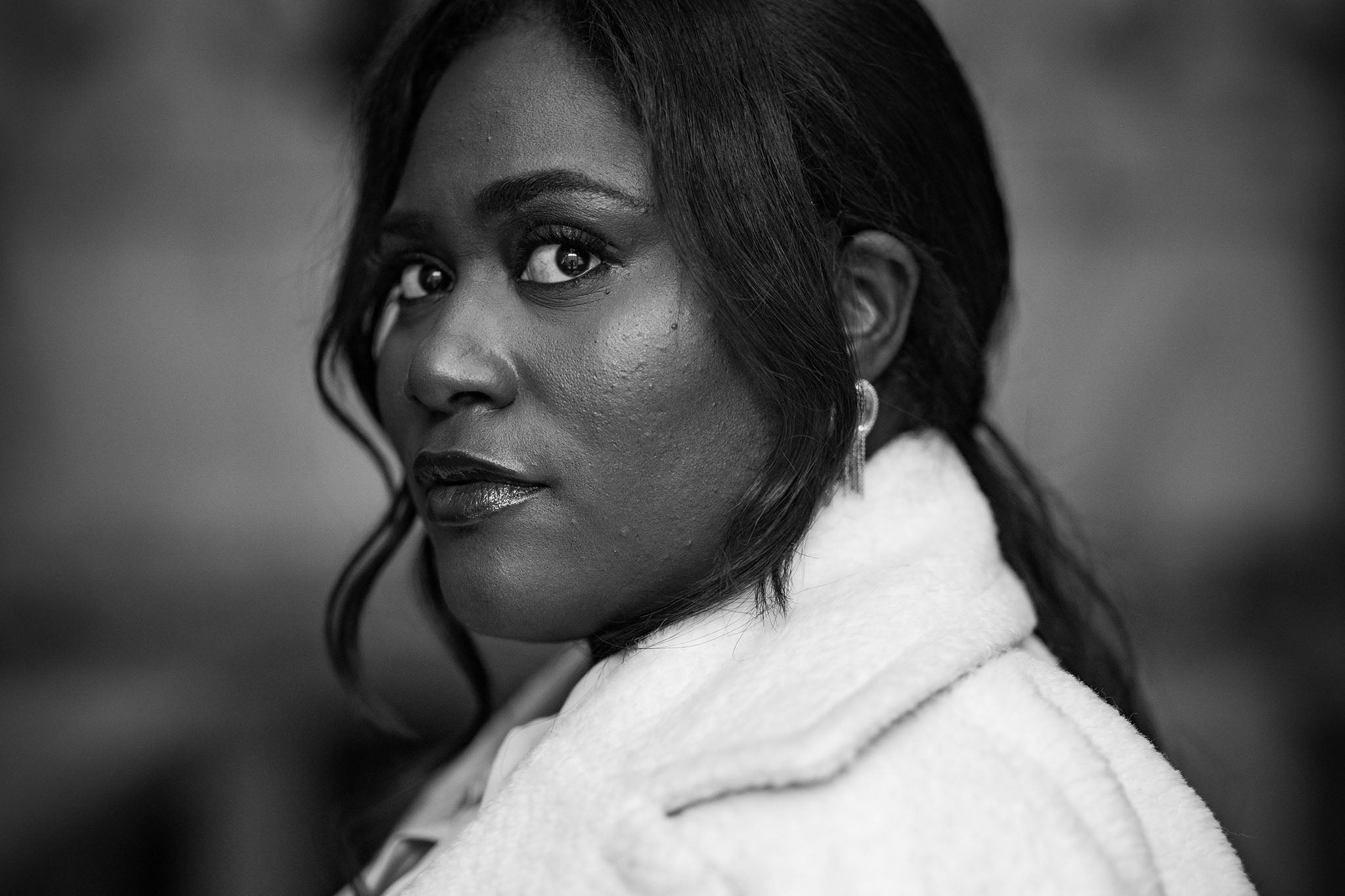Danielle Brooks on her Oscar nomination, fair pay and The Color Purple: ‘We are more than just sassy Black women’
The Oscar and Bafta nominee for ‘The Color Purple’ speaks to Nicole Vassell about getting so into character that she needed a chiropractor, and why she didn’t have ‘the luxury’ of challenging her salary while starring in ‘Orange Is the New Black’


Your support helps us to tell the story
From reproductive rights to climate change to Big Tech, The Independent is on the ground when the story is developing. Whether it's investigating the financials of Elon Musk's pro-Trump PAC or producing our latest documentary, 'The A Word', which shines a light on the American women fighting for reproductive rights, we know how important it is to parse out the facts from the messaging.
At such a critical moment in US history, we need reporters on the ground. Your donation allows us to keep sending journalists to speak to both sides of the story.
The Independent is trusted by Americans across the entire political spectrum. And unlike many other quality news outlets, we choose not to lock Americans out of our reporting and analysis with paywalls. We believe quality journalism should be available to everyone, paid for by those who can afford it.
Your support makes all the difference.Danielle Brooks knows how you’re meant to react to an Oscar nomination. The tears. The shock. The “Oh my gosh, I can’t believe it,” the Orange Is the New Black star mimics, dryly. “But,” she says, “I do believe it. This has been a culmination of so many years of hard work and patience; not getting discouraged, not quitting.”
The 34-year-old is speaking from New Zealand, where she’s filming a movie based on the video game Minecraft. After double-checking with me that our video call won’t be seen by anyone but the two of us, Brooks switches on her camera and grins, makeup-free and dazzling. It’s the same smile that won her an army of fans back in 2013, as Orange Is the New Black’s scrappy prison inmate Taystee. Though the Netflix hit focused initially on a white, blonde, fish-out-of-water felon named Piper (Taylor Schilling), it was Taystee who stuck with you.
Brooks gave the character warmth, intelligence, and a shiny optimism about life despite her circumstances. It’s a skill she’s now brought to The Color Purple, an adaptation of the stage musical based on Alice Walker’s seminal novel – and she’s earned Best Supporting Actress Bafta and Oscar nods in the process.
“You know when you’re going through hard times in this industry? I’ve finally made it to the top of the mountain,” she says. “Or, like, a rainbow.” Brooks likes a good metaphor, and expresses them with such conviction that you’re compelled to nod along politely even when they’re slightly unwieldy. “The beautiful thing about a rainbow is that there’s this journey to get into the pot of gold – and as beautiful as a rainbow is, it’s still shaped like a hill, a hill that you have to climb and get over.” She takes a breath, satisfied. “So that’s what it feels like – I finally hit the pot of gold.”
Brooks speaks flamboyantly of her own story, its wild curves and jagged peaks. She speaks flamboyantly of what she’ll leave behind, too. Despite her young age, legacy seems to be on her mind at all times – that her celebrity isn’t just a victory for her, but for all Black women. That her Oscar nomination is a testament not just to her own performance, but to The Color Purple in all its iterations. That a whole generation of little girls today will discover Walker’s work through the new film and find their lives transformed in an instant.
That last one is particularly important. Because, 20 or so years ago, she was that little girl. Brooks was 15 when she first saw the Color Purple musical on Broadway. She had travelled with her father to New York from her native South Carolina, having won an internship designed to guide young teenagers through the entertainment industry.
Walker’s novel and its later adaptations – including Steven Spielberg’s Oscar-nominated 1985 film – are about finding light in the darkest of places, telling the story of a poor Black girl named Celie living in 20th-century Georgia amid struggles and triumphs. For the young Brooks sat in the audience of the theatre, it was the actor Felicia P Fields who transfixed her – she played Celie’s daughter-in-law Sofia. Fields was a plus-size, dark-skinned Black woman being lit up on the New York stage. If she could do it, why couldn’t Danielle Brooks?
The Color Purple proved a constant once Brooks became a professional actor. She’d first play Sofia on Broadway in 2015, which led filmmaker Blitz Bazawule to cast her in the movie. She is remarkable in it, formidable and spirited. “Hell No” is her character’s signature number, a fight song in which she declares that she’d rather die than let a man hit her again. “Oh, you better learn how to fight back while you still alive,” she sings. “You show him girls can beat back that jive.” Brooks threw herself into the role, but sometimes so forcefully that she risked her own health.
When it comes to ‘The Color Purple’ and what it means to me, it wasn’t about the money ... I would have done it for $2
“I pulled my back from all of the swinging that I had to do to stop the men from hitting Sofia,” she recalls. “It took a toll on my body. What is forgotten is that bodies don’t know that we’re acting; our bodies think we’re really going through the thing. So I had to really take care of myself. And the production team was really great at connecting me with people who could help me to recover quickly.” That included a chiropractor and a physical therapist.

Watch Apple TV+ free for 7 days
New subscribers only. £8.99/mo. after free trial. Plan auto-renews until cancelled

Watch Apple TV+ free for 7 days
New subscribers only. £8.99/mo. after free trial. Plan auto-renews until cancelled
It’s the sort of dedication that Brooks learnt while studying at Juilliard, the famed arts school that trained the likes of Robin Williams, Jessica Chastain and Adam Driver. She booked Orange Is the New Black within a year of graduating in 2011, and found overnight success daunting. Orange transformed Netflix from a website that shipped rental DVDs to customers in the post to a streaming behemoth – along with House of Cards, the show was among the platform’s first forays into producing original content and helped to usher in the now-standard binge model of TV releasing. Brooks found herself getting recognised on the subway and while out shopping for groceries.

“My life had changed,” she remembers. “It was a lot to take in.” With fame came photo shoots and A-list celebrity events, but designers weren’t exactly lining up to provide looks for a young, plus-size Black actor. “I didn’t have money at the time to have security and have the look of a star,” she says. “I was just trying to figure it out, because the world might see you one way, but you know yourself to be different. It was a big adjustment.”
Brooks, like the majority of her Orange Is the New Black co-stars, was also so green to the industry that she didn’t have bargaining power when it came to her salary. Only after the series ended in 2019 did many of the show’s leads begin to speak about their lack of pay – Kimiko Glenn said she regularly receives literal pennies in residual earnings from the show, while Matt McGorry and Lea DeLaria both admitted having needed to maintain their day jobs, as a personal trainer and stand-up comedian respectively, while filming the show.
As for Brooks, she discovered that even for the final season of Orange – and long after the show had become a cultural phenomenon – she was still earning less money than the child stars of Netflix’s Stranger Things. “A part of me feels like it’s a little bit my fault because I should have fought more,” she said in 2020. “I should have put my foot down.”
Four years on, Brooks is not as hard on herself. “You live and you learn,” she sighs. “I think I did what I could and I fought for myself as much as I could.” She’s adamant that she wouldn’t accept the same treatment now. “I’m in a totally different place in my life and career. My needs are different. I have a family, and I have more agency to say yea or nay to projects and to the price that comes with that project. At the time, I needed to pay my rent and I didn’t have the luxury to say no. But now – what’s the phrase they say? ‘Yesterday’s price ain’t today’s price’?” She laughs, broadly, reeling back in her seat. “That’s the world I’m living in now.”

That said, despite her elevated status, respect and fair pay still don’t come easy. In the run-up to The Color Purple’s release, Brooks’s co-star Taraji P Henson spoke frankly about the salaries offered to her and her fellow actors – even admitting that she had nearly walked away from the film over pay. Brooks herself has also spoken about the lack of rehearsal space initially provided to the cast, and the absence of individual dressing rooms and food when the stars first arrived on set. It was only after Henson made a call to one of the film’s producers – Oprah Winfrey – that things improved.
Today, Brooks is hesitant to revisit those early battles. “To be honest, when it comes to The Color Purple and what [it] means to me, it wasn’t about the money.” She shakes her head. “It was not about the money,” she repeats, more defiant this time. “It was about legacy. It was about what I was leaving [behind]; how people would remember my name when I leave this earth. There’s no price tag. There’s no dressing room. There’s no fancy trailer that can compare to the gift that I have been given playing this role. I would have done it for $2, because I know the value in this story and what it means to me. What it’s given me.”
Brooks’s positivity is rousing and irresistible, but I’m curious about when the fight ends. She talks a lot about her acting work being more than a job – for her, it’s about representation, inspiration, and the footprints she leaves for those coming up behind her. Even her social media has felt purposeful: years ago she’d caption posts on her Instagram with the hashtag “#voiceofthecurves”. As much as she finds it fulfilling to be an advocate and a role model for young, dark-skinned Black girls – doesn’t it ever get tiring?
“This is what I’ve been ordained to do,” she insists. “And so it’s just up to me that I embrace it. I embrace being that example for younger girls, for people that feel connected to who I am – physically, or spiritually. I will forever be OK with that assignment. My whole thing is just to break the mould, and to really expand how we are viewed and how people take us in – that we’re more than just sassy Black women; we’re more than just best friend number four. We can do it all!”
She considers it for a moment.
“I am not meant for any box,” she says. “And we are capable of way more than you know.”
‘The Color Purple’ is in cinemas; the Bafta Film Awards screen on Sunday at 7pm on BBC One
Join our commenting forum
Join thought-provoking conversations, follow other Independent readers and see their replies
Comments